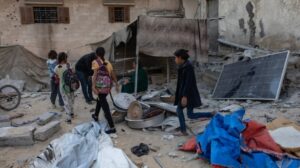Hello, tomorrow—most likely 24 hours before the rallies—the report on the Tempi accident will be made public by the responsible investigative committee. In this report, as my source tells me, “the public will have the opportunity to see a scientifically substantiated perspective on what happened that fateful night. From the responsibilities of the stationmaster and the other key figures of the nightmare (by the way, have we forgotten them all?) to the administrative and political oversights regarding the…chaos that is called OSE and Hellenic Train. What existed before Tempi and how much train safety has improved since then. There will also be an opinion, though without certainties, on the issue of ignition, as no flammable materials have been found so far. Let’s hope people read it carefully and draw their own conclusions.” This is what my source from M.M. said, but I assure you that those who want to misinterpret it…will do so. And perhaps just as many will talk about a fake report, etc. But, of course, anyone who wants to read something responsible will do so—after all, that’s how it always is with all matters in life and daily affairs. Or not?
They won’t bring me down…
The question is what happens to the government after the rallies and after the discussion in Parliament regarding the preliminary investigation. The same source, who is at the heart of Maximos Mansion, responded to me that “the prime minister will not negotiate the country’s stability with those who want to bring him down. He listens to public opinion, assesses, and makes corrections, but he will not accept political destabilization over an alleged cover-up that is not substantiated by anything. Mitsotakis will continue to govern, he will correct the governance’s shortcomings, and where necessary, he will correct himself in wrong decisions and move forward.” We’ll see about that because, to be honest, at this moment, in light of Tempi, nothing is functioning. People neither want the government to fall 18 months after its re-election nor do they want the current state of political paralysis.
Communication strategy for the weekend
Given the large rallies on Friday, I hear that at M.M., the communication strategy for the weekend and the government’s representation by ministers on panels has already begun. Four TV channels have morning shows on Saturday and Sunday, and government representation is being sought from prominent officials who will bear the burden of responses. The directive (as K.M. will also set it out in today’s Cabinet meeting) is simple: everyone has the right to attend the protests, but they should be aware that opposition parties will try to exploit them.
A little awareness?
Before I leave this topic, a note. It is inevitable, given the enormous publicity surrounding the case of the investigator’s deceased child, that the authorities are examining—under the spotlight of this completely intrusive publicity—his medical record, very personal data in his history. There are details there that, first and foremost, his own people should have respected before initiating this terrifying rumor. Has a little awareness been lost? As for Samaras and what he’s saying, I think there are no words, and for those who have known him for a long time, it’s not even surprising. He has always been like this.
Fresh money in party coffers
Fresh money amounting to 18 million euros is flowing into party offices as the first installment of state funding for 2025 has been released. The amounts are 6.6 million euros for ND, 3.1 million euros for SYRIZA, 2.2 million euros for PASOK, approximately 1.6 million euros for KKE, just over 1 million euros for Hellenic Solution, 980 thousand euros for Niki, and around 900 thousand euros for Course of Freedom. For the first time, state funding is also being granted to Aphrodite Latinopoulou’s Voice of Reason, due to the percentages it achieved in the last European elections.
New “delusion” regarding payment of workers at Kokkino and Avgi
The disbursement of 3.1 million euros provides significant relief to Koumoundourou; however, its leadership does not seem willing to address the massive problem of unpaid workers at the party’s media outlets. According to reliable sources of this column, Socrates Famellos had promised the staff of “Kokkino” and “Avgi” that last Friday he would present them with a detailed roadmap for the payment of their wages, which have now reached 3.5 months of arrears. However, the plan was withdrawn, and instead of being informed, the employees learned that they would receive 1.5 months’ salary. As if that weren’t enough, they saw Socrates Famellos on TV declaring that he would not allow SYRIZA to go bankrupt, implying that the party’s media outlets have already gone under.
Dendias and the Meteor
The visit of Dendias to London and his meetings with his British counterpart Healy and the country’s National Security Advisor are by no means insignificant, given that Great Britain has once again started playing a significant role in Europe’s security architecture. On the other hand, I hear that, particularly in his meeting with Mr. Healy, Nikos Dendias explained in greater detail the particularities of our region and raised the issue of the Meteor missiles, in an effort to apply pressure from the British side as well on the manufacturing consortium.
Kairidis met Zelensky in Kyiv
At a time when Western support for Ukraine is being tested, several Europeans are sending a message of support to Kyiv. Among them is ND MP Dimitris Kairidis, who traveled to the Ukrainian capital and had meetings, among others, with Ukrainian President Zelensky, who insists on a lasting peace, as well as with Ukrainian Defense Minister Umerov. Kairidis, who was on a mission of European parliamentarians, saw firsthand the defensive efforts of the Ukrainians, and he believes that there is now a unique opportunity for European defense, given that even staunch “Atlanticists” recognize the need for the Union’s emancipation. Something that, of course, also benefits Greece.
Interventions for the Press
On today’s Cabinet agenda is a bill by government spokesperson Pavlos Marinakis concerning issues related to the print and electronic press. In reality, Marinakis is rushing to satisfy a series of reasonable requests from the Press Unions regarding the Registry of Print and Electronic Press. The government’s goal is to support regional media as much as possible, as well as podcasts, which have begun to establish an autonomous presence.
At PwC, they’re playing Game of Thrones
The market says that in recent times, Game of Thrones is being played with great success at PricewaterhouseCoopers (PwC) Greece. The CEO of PwC, Marios Psaltis, having successfully managed operations in Greece, is now at the point of stepping down, as he completes his fourth consecutive term at the helm of the auditing firm. There are five candidates for succession, but as the Game of Thrones unfolds, only three remain in the race. In fact, according to what is circulating in the market, those who withdrew were actually the frontrunners, the strongest candidates to succeed M. Psaltis, but they were undermined by various allegations of harassment, misconduct, and similar accusations. Why does this column refer to the insidious “stabs” they received in English? Because that’s how they were described to the American lawyers involved in the selection process for the new CEO.
Why did Paulson choose the competitor of Piraeus Bank?
As it became evident from the pressure on Piraeus Bank’s stock in yesterday’s session, Paulson did not choose the best timing to sell his 2.8% stake in Piraeus Bank, although he could not have done so earlier due to the restriction in place before the results period. However, what caught the market’s attention was that yesterday, the transaction involving the major shareholder’s package in Piraeus Bank was not conducted through Piraeus Bank’s brokerage, as the market expected, but through Eurobank’s brokerage. The column inquired but did not receive a convincing answer as to why the brokerage of a competing bank was chosen for the transaction. It couldn’t have been a mistake. Could Paulson be trying to send a message, or was this Goldman Sachs’ choice?
What are they “baking” at Hellenic Dough?
We have spoken about Hellenic Dough before. Vivartia denies rumors of a sale, although information that CVC is in discussions with a specific investor involved in the food sector in Greece comes from a reliable source. However, it seems that some kind of “clearing out” has begun at Hellenic Dough. I say this because, by a decision made on February 21, an agreement was reached between the two shareholders of Hellenic Dough (Frozen Holdings and M. Arabatzis) for the sale of 13 commercial properties of the company in Sindos to the founder, minority shareholder, and CEO Michalis Arabatzis or members of his family.
Mr. Pantelis’ capital increases
The hotel magnate Pantelis Mantzounanakis has proven to be, as is well known, a master player in maneuvering against both banks and the state. Thus, none of his moves should be interpreted as random. I say this because I have learned that, recently, he proceeded with two share capital increases in the company “Attikos Ilios” (which manages Grand Resort Lagonissi), making cash payments no less, despite not being known for his generosity. Recently, there have also been relevant reports from the Independent Auditor as well as the company’s Board of Directors minutes certifying the full payment of the capital increase of €1,210,000, decided by the General Assembly on 10/29/2024, and the more recent increase of €1,458,000, decided by the General Assembly on 12/19/2024. Let me remind you that in the first case (October), the share capital increased by €990,000, with the issuance of 99,000 common shares with a nominal value of €10 each, paid in cash. Simultaneously, the same General Assembly converted the nominal value of the common shares from €10 to €50 each. Furthermore, with the same Assembly, the share capital increased by €220,000 with the issuance of 22,000 “nominal, non-transferable, redeemable preferred shares, without voting rights, with a nominal value of €10 each and designated as ‘Series 1’.” With the extraordinary General Assembly on December 19, 2024, the share capital increased by €1,458,000 with the issuance of 29,160 common nominal shares, with voting rights, at a nominal value of €50 each, paid in cash. In other words, he invested €2,668,000, and certainly not by chance.
The new faces at Attica Bank
Today, in a General Assembly, the shareholders of Attica Bank will approve the election of a new board of directors and the appointment of independent non-executive members. According to the proposal to the shareholders, a new 13-member board (up from 12 members currently) with a three-year term (until 02/26/2028) is proposed. New faces entering the administration include, naturally, Konstantinos Herodotou, the former governor of the Bank of Cyprus, who will be the new chairman of Attica Bank. Also, Konstantinos Makedos, President of TMΕDE, the well-known professor and President of KEPE Panagiotis Liargovas, and Nikos Bakos, son of D. Bakos and head, among other roles, of Smart Tankers Inc and Volton. Note also that on 03/10, the bank will announce its financial results for 2024. For the seventh consecutive time! I mention this because it is a record that we do not often hear about in the Greek market, especially at a time when ambitions are growing in chambers, associations, unions, etc., leading to electoral confrontations. The Hellenic Association of Insurance Companies held elections for the 2025-2026 term, and Alexandros Sarrigeorgiou was elected President for the 7th consecutive time. With the completion of this term, Al. Sarrigeorgiou will have served 14 years as president.
Fears of the end of the upward cycle
The simultaneous double sale by major shareholders in Piraeus and Lamda Development, just days before the end of a profitable two-month period for the Greek Stock Exchange, sent a mixed signal to the market. Many rushed to predict the end of the upward cycle and hurried to liquidate profitable stocks. However, early in the morning (at 11:10), buyers appeared at Eurobank’s lows. At 11:30, buyers supported Alpha Bank. After 14:30, many bought National Bank shares at their lows. In the end, Eurobank (+1.46%) closed at €2.51, Alpha (+0.76%) at €1.859, and National Bank (+0.33%) at €8.418. Piraeus was clearly affected by John Paulson’s large €160.3 million share package, closing the session at €4.542 with a -3.97% drop. The General Index lost the 1,600-point level but, with Coca-Cola’s help, limited losses to 1,596.64 points (-0.46%). Trading volume reached an impressive €367.5 million, as apart from the Piraeus package, there were also 41 prearranged transactions worth €30.2 million. Market sentiment abroad remains uncertain. The German bond yield “ticked up” to 2.5% after the elections and settled at 2.4% yesterday. The US Treasury yield stands at 4.3%, the French at 3.19%, and the resilient 10-year Greek government bond at 3.28%.
On Wall Street, the infamous “Magnificent 7” are losing ground
The seven largest technology companies (Apple, Nvidia, Microsoft, Alphabet, Amazon, Meta, and Tesla) have wiped out $1.4 trillion from their market capitalization. They have lost more than 10% compared to their December highs. The limits of a correction have been exceeded. The tariff war has its casualties…
China, with 1.4 billion inhabitants, is facing a demographic problem!
On New Year’s Day 2016, the then-Chinese government officially announced that all couples in the country were allowed to have two children. That announcement marked the end of China’s “one-child policy,” which had lasted for 35 years. Today, China is facing a demographic crisis! China’s population declined by approximately 1.4 million in 2024, dropping to 1.41 billion. It was the third consecutive year of population decline. In 2024, the country recorded the second-lowest number of births since the founding of the People’s Republic of China in 1949. A Bloomberg survey estimated that China’s population will shrink by about 50 million by 2035, reaching 1.36 billion, the lowest level since 2012. At the same time, the working-age population has been steadily decreasing over the past five years. Currently, there are five workers for every retiree in China. Twenty years ago, at the beginning of the century, the number of workers per retiree was double. Projections suggest that this ratio will decrease to three workers per retiree over the next decade. This dramatic shift has its consequences: Significant capital reallocations are taking place from China to higher-growth regions. The country is under pressure to increase automation to offset labor shortages. The fewer people working, the harder it becomes for China to manage its enormous public debt.
Ask me anything
Explore related questions





